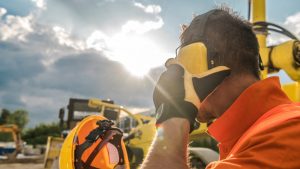The pain is there every day. “It is something like a constant fear and nightmare. Mentally and emotionally, I am always dealing with it,” said Dilshod Marupov, referring to the 2009 Christmas Eve swing stage tragedy in which four men died and he survived.
Occupational Health and Safety
The pain is there every day.
“It is something like a constant fear and nightmare. Mentally and emotionally, I am always dealing with it,” said Dilshod Marupov, referring to the 2009 Christmas Eve swing stage tragedy in which four men died and he survived.
The physical pain is evident as Marupov sits on a couch to reflect on the year since that tragic day.
Sometimes he rubs his knee, other times his shins.
At moments, while talking, he leans his body far to the left, although in a seated position, to alleviate pain in his lower back and hips.
Marupov’s English is limited but he spoke recently through translator Ruslan Takhautdinov.
Vladimir Korostin, Aleksey Blumberg, Alexander Bondorev and Fayzullo Fazilov —Marupov’s coworkers — were killed on Dec. 24, 2009 when their 40-foot long swing stage came apart, plunging them 13 storeys to the ground below.
They were working at an apartment restoration site on Kipling Avenue in Toronto.
“I still think about that day,” said Marupov.
The twenty-two-year-old trained welder from Uzbekistan had been in Canada three months when he found work at the renovation project thanks to Fazilov.
Both men called Samarkand, the second-largest city in Uzbekistan, home.
“It was my second day at that job when the accident happened,” said Marupov solemnly.
Before starting on the road from Samarkand, noted for its central position on the Silk Road between China and the Mediterranean, to Canada, Marupov had studied some basic English.
He came to Canada on his own because it is a “very well developed country” and he wanted to ply his welding trade here.
“I tried to pick up some words that would help me to ask for a job,” he explained.
“When I would see someone at a construction site, I would ask them for a job, but they would not take me.”
Coincidentally, the day of the swing-stage tragedy, Marupov had spoken to someone about a welding job.
He was told to call this potential employer after Christmas and set up a time to demonstrate his skills.
Now, as he tackles his slow recovery from injuries, that included both legs being crushed and severe spinal damage, his lone focus is his health, but he acknowledges the recovery doesn’t stop there.
“I am not the same as I was before the accident,” he said. “It is difficult to put into words, but now it is a different approach when it comes to life.”
“It is difficult to put into words,” he repeated.
Like many immigrant construction workers before him, Marupov had hoped to get a foothold in the industry, gaining experience along the way and to eventually open his own contracting business.
“I had plans to open my own company to make metal fences and balconies, for yards, homes,” he said.
“My plan was to eventually to stay permanently in Canada.”
In the days and months after the swing-stage tragedy, industry and government leaders and the public rallied to find ways to improve health and safety on Ontario worksites.
The plight of immigrant and undocumented workers — including the fear of refusing unsafe work — mandatory entry-level training and the strength of government inspections and regulations were among the issues raised.
An expert review panel looked into Ontario’s prevention and safety system and delivered almost 50 recommendations, including the creation of a chief prevention officer.
The Ontario Ministry of Labour brought 61 charges in August, under the Occupational Health and Safety Act, against the employer and equipment supplier connected to the accident.
Also, three men, Vadim Kazenelson, Joel Swartz, and Benny Saigh, now face criminal charges in connection with the tragedy, facing four counts of criminal negligence causing death and one count of criminal negligence causing bodily harm.
Metron Construction Corp. (Swartz’s company) also faces the same charges.
Marupov also has a civil case underway.
The Provincial Building and Construction Trades Council of Ontario spearheaded an effort with various industry stakeholders to help bring Marupov’s family to Canada, which took 10 months to complete.
“Thank God, I have the love of my family close to me. It is helping me,” he said.
He chuckles lightly when he reflects on the bureaucratic process the Building Trades tackled on his behalf to help reconnect him with his family.
“They went through a lot of paper to get my parents here,” he said smiling.
Moira Hamidova, Marupov’s mother, also laughed lightly and came in from the kitchen, where she was preparing small appetizers, while listening to the interview.
When asked about her and her husband’s journey to Canada to be with their son, she sat near him.
“For me, the main thing is to see him healthy,” she said through the translator.
“When I saw him with my own eyes, my soul finally calmed down. For many months after the accident all I did was cry and cry.”
As the interview closed he was asked what advice he has for new workers in Ontario.
“Before you get to the job, be sure to be trained and for them to protect their life and be on guard for it.,” he said.
He’s not yet sure what he’ll do after he recovers.
“My life will show me. My mother has told me I have to regain my health.,” he said.











Recent Comments
comments for this post are closed